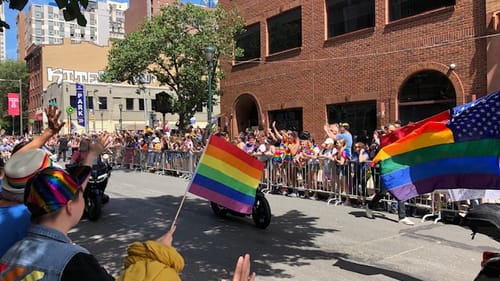Stay in the Loop
BSR publishes on a weekly schedule, with an email newsletter every Wednesday and Thursday morning. There’s no paywall, and subscribing is always free.
A quiet kind of pride
During Pride, do queer introverts trade one closet for another?

Pride began as a riot, and every June, there’s a riot of celebration that descends upon our cities, parties, and parades. Dull, dusty affairs like bingo and story hour are made fabulous by attendant drag queens. Music pours out of speakers set to 11 and rainbows paint the buildings, the clothing, the ground, and even the very air we breathe. It’s a glorious celebration of the LGBTQIA+ community, a cascade of beautifully diverse bodies coming out in connection from sea to shining sea.
It is also a living nightmare.
Beautiful from afar, panic up close
I came out in my 30s, and for years prior, I had considered Pride events a safe place to dip my toe into the unknown waters of queerness and explore my identity before I was ready to claim the name. But both before and since coming out, going to Pride has required a massive self-psych-up session that had nothing to do with queerness and everything to do with sensory overload.
I’ve been described as shy, quiet, an “old soul,” an introvert. As an adult I’ve played with the idea that something neurological sets me apart from my peers, but since self-diagnosis is a dangerous game with no winners, I’ll say only this—the same things that bother and baffle my students on the autism spectrum confound me as well.
Regardless of the label, for me, Pride’s extravagance and exuberance are beautiful to witness from afar but hellish to participate in. The cacophony of sound and sight sends me into panic mode, causing me to cling to any vaguely familiar face and cower in a corner, gasping for a respite.
All of this, of course, is internal. Externally, I simply become a closed-off killjoy with a high, tight smile that radiates “don’t talk to me.” Self-preservation prohibits connection, which negates the point of going to Pride in the first place.
Beyond Philadelphia
It would be easy to write this off as a Philadelphia problem—cities are by nature loud and crowded, and Philly’s celebrations are entrenched in history—but even in small, suburban towns where the celebration spans all of a block and Pride events are in their infancy, quiet coffeehouses erupt in heavy bass and pulsating bodies, cutting me off from the very places I naturally seek out.
Even though LGBTQIA+ spaces seem to be diametrically opposed to the mainstream, they actually exist as a microcosm. White, cisgender, able-bodied, thin men are the face of the movement, with all the attendant racism, transphobia, ableism, fatphobia, and sexism entrenched in our society reflected back to us in an allegedly safe space. Here, as in the mainstream world, extroverts are the gold standard of personality while introverts run a spectrum that veers dangerously close to pathology. You can be queer or you can be quiet—never both.

The comfort zone
There’s an adage that life begins at the end of one’s comfort zone, and to an extent that’s true. In terms of travel, new experiences, and the pursuit of knowledge, complacency is the enemy. But when I want to simply exist as myself in my community, I’m continuously forced to perform a personality that’s diametrically opposed to my reality.
Pride is supposed to celebrate authenticity, but the more I try to be part of the experience, the more I have to prioritize my queerness over my introversion, even though I am both things all the time no matter how many people and rainbows surround me. I can gather my wits enough (with the help of well-applied libations) to fake extroversion for a few hours, but if queer spaces require an alcohol-induced façade, it feels like I’ve merely traded one closet for another.
There’s always the Internet. Online forums and social media were a place where I could safely claim labels like “bisexual” and “queer” without ever once vacating the comfort of my couch or sacrificing a valuable Netflix binge. I count a treasured handful of people with whom I’ve never shared any physical space as not only friends but mentors. However, a community confined to the Internet means that I’m isolating part of myself to one arena instead of existing fully in all of them, and I say that as someone living in a gay-friendly suburb abutting a gay-friendly city, at least in theory.
All realities
Privilege means that I can survive fairly easily without the support of an active community. I’m white, able-bodied, cis, and straight-passing, but introversion and queerness cut across all communities. That which I find irritating or exhausting can be isolating and life-threatening to anyone who can’t find a space that accommodates all their realities.
It isn’t that I don’t want to celebrate the glory of Pride and the sheer joy of being visible in a way that defies all the ways the world wants to erase me. I just want to be able to do it in a space that leaves me with elbow room and the ability to hold a conversation. I want to know more about the people I’m meeting than their names and pronouns. I want to feel that my whole self is as welcomed and loved in the space as I deserve to be, because I finally love myself enough to know that I’m worth it. Mostly, I just want to make sure quiet queer, trans, or gender-nonconforming people aren’t being smothered by the celebration. Pride is a time to hear our voices, not drown them out.
Sign up for our newsletter
All of the week's new articles, all in one place. Sign up for the free weekly BSR newsletters, and don't miss a conversation.

 Michelle Nugent
Michelle Nugent